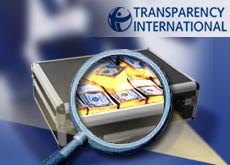Money laundering laws face new challenges

Switzerland’s laws on money laundering need to be adapted to keep pace with new ways of washing dirty money.
The Swiss government’s annual report into combating money laundering says measures are continually being revised in order to meet new threats.
When new legislation on money laundering was introduced in 1998, it was said that disposing of dirty money in Swiss banks would become almost impossible.
But money launderers have found many other ways to clean their cash: through casinos or hotels, or through life insurance policies.
Switzerland is looking to draw up legislation to cover these loopholes; like bankers, casino operators and insurance salesmen will be obliged to report suspicious transactions.
Gold and gems
Another way of laundering money is to buy precious stones or metals with dirty cash and then sell them on again. At the moment dealers in gold and gems are not under any obligation to report suspicious sales.
But the Financial Action Task Force (FATF), the body set up by the Organisation for Economic Cooperation and Development to introduce international guidelines on money laundering, wants that to change.
Dina Balleyguier, who is head of Switzerland’s Money Laundering Control Authority says a change in the law is under discussion.
“For dealers in precious metals and stones there is certainly an opportunity to launder money which is not within the scope of the law at the moment,” she told swissinfo.
“So we will have to discuss whether we – and how we – take up the FATF recommendations on this point.”
Lessons learnt
Nevertheless, officials are convinced that Switzerland’s long-time reputation as a haven for dirty money is now undeserved.
“In fact we have had a lot of praise from other countries for the measures we have taken,” said Balleyguier.
Infamous cases like that of the Philippines’ Ferdinand Marcos or Sani Abacha of Nigeria would be most unlikely to occur again in Switzerland, according to officials.
“We’ve learned our lessons from those cases,” said Eva Hüpkes of the Swiss Federal Banking Commission.
“It is extremely difficult to launder money in Switzerland,” she insisted. “Walk into any Swiss bank with a suitcase full of money and see what happens – you won’t get very far.”
Not a model example
But officials insisted Switzerland did not intend to become a model for the rest of the world when it came to combating money laundering.
Switzerland’s reputation as a safe and discreet place to invest money also needed to be preserved, said Alexander Karrer of the finance ministry.
“Switzerland’s financial services sector is extremely important for our economy,” he said. “And that must remain.”
His comments relate to continued disagreements with the European Union and OECD over Switzerland’s banking secrecy laws.
While banking secrecy is immediately lifted if a crime is suspected, Swiss law does not regard tax evasion as a crime, and here the EU wants more openness from the Swiss.
“I think we have very comprehensive legislation,” Karrer told swissinfo. “And we cooperate internationally in all areas of financial crime.”
“But at the same time we have to ensure the integrity of the Swiss financial market and prevent abuse of the financial privacy regulations which we still maintain are appropriate.”
Changes afoot
However, there are more revisions to Switzerland’s money laundering legislation in the pipeline.
There are plans to extend the existing reporting obligation covering suspicious transactions to include suspicious attempts to invest funds.
And banks and investors will be required to make risk assessments before accepting funds from foreign sources.
This is to prevent money coming into Switzerland from the corrupt leaders of failed states or from international drug cartels.
swissinfo, Imogen Foulkes
Switzerland gained a reputation as a haven for dirty money because banks accepted funds from corrupt figures such as Ferdinand Marcos of the Philippines and Sani Abacha of Nigeria.
Anti-money laundering legislation introduced in 1998 obliges banks to report all suspicious transactions.
The FATF expects insurance companies, financial intermediaries, casinos and dealers in precious metals are expected to fulfill this obligation too.
Reports of suspicious transactions from casinos and insurance companies have increased in Switzerland. Officials say this shows the legislation is working.

In compliance with the JTI standards
More: SWI swissinfo.ch certified by the Journalism Trust Initiative











You can find an overview of ongoing debates with our journalists here . Please join us!
If you want to start a conversation about a topic raised in this article or want to report factual errors, email us at english@swissinfo.ch.